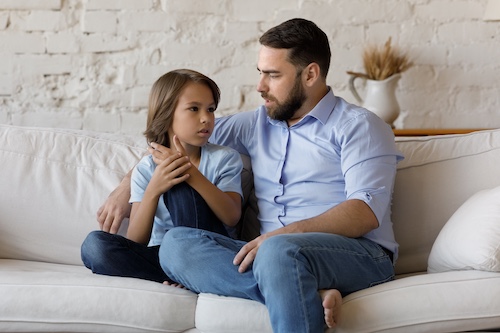How to Explain Addiction to a Child: A Guide for Families Facing Substance Use
Children living with a parent’s addiction often see more than adults realize. They notice the tension, the changes in behavior, and the silence that follows. If you are a caregiver or family member wondering how to explain addiction to a child, the goal is to provide clear, honest information that matches the child’s age and emotional needs. This conversation is not just important; it is necessary for the child’s emotional safety, long-term mental health, and ability to make healthy choices.
In this blog, you’ll learn how to explain addiction to a child, with practical guidance by age and support options from Carolina Recovery’s Raleigh addiction treatment center.
Why You Must Talk to Children About a Parent’s Addiction
Children living with a parent who has a substance use disorder face emotional, behavioral, and developmental risks. Talking to them early can protect their mental health and support healthier outcomes.
Silence Can Lead to Harm
When families avoid talking about addiction, children often feel confused and afraid. Many children blame themselves for a parent’s substance use. Without clear facts, they may believe they caused the problem or that they can fix it. This misunderstanding can lead to emotional abuse, anxiety, or poor behavior at school.
Children Understand More Than You Think
Children notice when a parent is struggling. They hear arguments, see mood swings, or feel neglected. Even if they do not know the word “addiction,” they sense something is wrong. Honest communication helps them understand addiction as a disease, not as bad behavior or a moral failure.
Early Conversations Support Mental Health
Explaining addiction early reduces the risk of long-term mental health issues. Children who understand the situation are more likely to feel safe. They also show better coping skills and fewer signs of distress. These are strong protective factors in homes affected by parental substance abuse.
Talking Helps the Whole Family
When one family member has a substance use disorder, the entire household is affected. Open discussion can improve relationships with siblings, other family members, and caregivers. It helps children express feelings and ask questions, rather than hide pain or develop unhealthy behaviors.
Secrecy Increases the Risk of Future Addiction
Children of substance abusing parents face an increased risk of developing a substance use problem themselves. Honest conversations about a parent’s addiction help children make healthier choices. They are more likely to avoid alcohol, drugs, and other substances when they know the truth and feel supported.
Understanding the Child’s Perspective by Age and Developmental Stage
Children respond to a parent’s addiction based on their age, emotional maturity, and what they observe at home. Matching the explanation to their developmental stage helps reduce confusion and fear.
Early Childhood (Ages 3 to 6)
Young children are highly sensitive to changes in routine and behavior. They may not understand words like addiction or substance use, but they react to stress, loud voices, or absence. At this age, children often blame themselves when a parent is upset or unavailable. Use simple and clear language, such as “Mommy is sick and getting help.” Reassure them they are not the cause and that adults are working to fix the problem.
School-Age Children (Ages 7 to 12)
School-age children start asking more questions and noticing patterns. They may recognize the signs of drug abuse or alcohol use, even if they do not fully understand them. They can feel shame, guilt, or anger. These children need facts explained in clear terms. Tell them addiction is a disease that affects how the brain works. Let them know the parent’s substance use is not a result of bad choices alone and that help is available.
Teenagers (Ages 13 and Older)
Teens often understand much more than they say. They may hide their feelings, act out, or avoid the subject. Some may take on adult roles at home, trying to protect younger siblings or manage stress. Others may be at higher risk of using substances themselves. Talk honestly about the dangers of substance use and the importance of mental health. Encourage open conversations and offer support from counselors, teachers, or community resources.
Children with Trauma or Abuse
Children exposed to emotional or sexual abuse related to a parent’s substance use need professional care. Trauma affects how children process information and express emotions. These children may withdraw or show aggressive behavior. A social work or mental health professional can help create a safe environment for them to talk and heal.
What to Say (and Not Say) When Explaining Addiction
How you talk to a child about a parent’s addiction shapes their understanding, emotional safety, and trust in adults.
Use Clear and Honest Language
Tell the truth in a way the child can understand. Use direct words like “addiction,” “alcohol,” or “drugs” rather than vague terms. Explain that addiction is a disease that changes how a person’s brain works and affects their behavior. Say, “Your parent has a disease called addiction. It makes it hard for them to stop using alcohol or drugs, even when it causes problems.”
Keep It Short and Focused
Children do not need all the details. Avoid long explanations about treatment plans or past events. Focus on helping them feel safe and supported. Say only what they need to know to understand the situation without fear or confusion. This helps prevent overwhelm and keeps the message clear.
Reassure, Don’t Blame
Tell the child they are not responsible for the addiction. Use statements like “This is not your fault” and “You did not cause this.” Blaming the parent or arguing about the addiction in front of the child increases stress. Instead, explain that adults are taking steps to help the parent and keep the family safe.
Avoid False Hope
Do not promise recovery or say everything will be fine. Be honest about the fact that treatment takes time and that setbacks may happen. Saying “Your parent is getting help” is better than saying “They will be better soon.” Children need honest hope, not unrealistic guarantees.
Say What the Child Can Do
Let children know how they can take care of themselves. Encourage them to talk to a trusted adult, take part in school or community activities, and share their feelings. Tell them they are allowed to feel sad, angry, or confused. Helping children focus on what they can control reduces fear and supports healthy choices.
Practical Tips for Talking to a Child About a Parent’s Substance Use
A direct, calm conversation can help children understand a parent’s substance use and feel more secure during a difficult time.
Pick the Right Time and Place
Choose a quiet time when the child feels safe. Avoid starting the conversation during a crisis or argument. A calm setting helps the child listen and ask questions without fear or distraction.
Use Words the Child Can Understand
Match your language to the child’s age. Younger children need simple explanations like “Daddy is sick and needs help to stop using alcohol.” Older children can understand more, but still need facts stated clearly. Avoid slang or technical terms that may confuse them.
Focus on Safety and Reassurance
Let the child know they are safe. Tell them there are adults taking care of the situation. Reassure them that their needs will be met. This helps reduce anxiety and builds trust.
Encourage Questions
Invite the child to ask anything they want. If they do not ask questions right away, let them know they can come back later. This shows that it is okay to talk about a parent’s addiction and that their thoughts matter.
Repeat Key Messages
Children often need to hear the same message more than once. Remind them that addiction is not their fault. Tell them their parent’s substance use is not caused by anything they did or said. Repeating these points helps them remember the truth.
Offer Support and Resources
Let the child know they are not alone. Encourage them to talk to teachers, counselors, or other family members. Connect them to school support, youth groups, or mental health professionals. These services are important for children affected by parental substance abuse.
Support for Your Family Starts At Carolina Recovery!
Helping a child understand a parent’s addiction is one of the most important steps you can take to protect their emotional health. You do not have to do it alone. Our team at Carolina Recovery in Raleigh offers family-focused addiction treatment and support services designed to help parents, children, and caregivers through every stage of recovery.
Contact us at (812) 408-8842 for a free consultation today!







